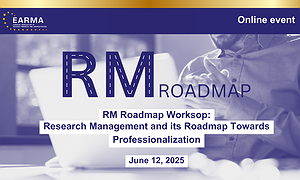By James Casey, Esq., CPP
If you ask a research manager whether there is a parallel between a guiding management principle of a U.S. president and the field of research management, most likely he or she would say there is no parallel. But there is. The parallel is the concept of balance, which was a guiding principle of the 34th president of the United States, Dwight D. Eisenhower. He served as president from 1953 – 61, and many older Europeans know him as the architect of the D-Day Invasion and as the Supreme Commander of the Allied Expeditionary Force in Europe during World War II. The concept of balance was central to his management core. Let us examine the concept of balance a bit more.
One of the more intriguing definitions of balance found in the online version of the Merriam – Webster Dictionary is “equipoise between contrasting, opposing, or interacting elements.” Using this definition, what does balance mean to research managers? And how is balance achieved at the global level? For many research managers, these are examples:
- Facilitating faculty research while complying with sponsor terms and conditions
- Balancing research and teaching
- Maintaining research integrity while growing research funding
The issue of balance in research management came to mind when I recently watched the farewell address of President Eisenhower, given to the American people on January 17, 1961. While his address is most famous for his warning regarding the influence of the “military – industrial complex” in the halls of government, he also had the following to say about U.S. Government and corporate support of basic and applied research:
“Crises there will continue to be. In meeting them, whether foreign or domestic, great or small, there is a recurring temptation to feel that some spectacular and costly action could become the miraculous solution to all current difficulties. A huge increase in newer elements of our defense; development of unrealistic programs to cure every ill in agriculture; a dramatic expansion in basic and applied research - these and many other possibilities, each possibly promising in itself, may be suggested as the only way to the road we wish to travel.
But each proposal must be weighed in the light of a broader consideration: the need to maintain balance in and among national programs - balance between the private and the public economy, balance between cost and hoped for advantage - balance between the clearly necessary and the comfortably desirable; balance between our essential requirements as a nation and the duties imposed by the nation upon the individual; balance between action of the moment and the national welfare of the future. Good judgment seeks balance and progress; lack of it eventually finds imbalance and frustration.”
Later in the address he states:
“Akin to, and largely responsible for the sweeping changes in our industrial - military posture, has been the technological revolution during recent decades.
In this revolution, research has become central; it also becomes more formalized, complex, and costly. A steadily increasing share is conducted for, by, or at the direction of, the Federal Government.
Today, the solitary inventor, tinkering in his shop, has been over - shadowed by task forces of scientists in laboratories and testing fields. In the same fashion, the free university, historically the fountainhead of free ideas and scientific discovery, has experienced a revolution in the conduct of research. Partly because of the huge costs involved, a government contract becomes virtually a substitute for intellectual curiosity. For every old blackboard there are now hundreds of new electronic computers.
The prospect of domination of the nation's scholars by Federal employment, project allocations, and the power of money is ever present and is gravely to be regarded.
Yet, in holding scientific research and discovery in respect, as we should, we must also be alert to the equal and opposite danger that public policy could itself become the captive of a scientific - technological elite.
It is the task of statesmanship to mold, to balance, and to integrate these and other forces, new and old, within the principles of our democratic system - ever aiming toward the supreme goals of our free society.”
(For further reading on his management principles, check out the recent book published by his granddaughter, Susan Eisenhower, entitled, How Ike Led: The Principles Behind Eisenhower’s Biggest Decisions (Thomas Dunne Books, New York, 2020)).
While his farewell address was given to the American people 60 years ago, President Eisenhower’s comments then, and the global research and research management enterprise now, remain in lockstep today. While the challenges in the field of research management today are significant and constantly changing, it seems that faculty, staff and administrators at universities, colleges, and research entities should take a closer look at the concept of balance. In fact, the concept of balance could be considered a sibling of another significant - primarily American - research management concept – administrative burden. Administrative burden, in the field of research management, may be considered a lack of balance between forces and agendas in the research enterprise.
Not only has the U.S. research enterprise – and research management – changed dramatically since President Eisenhower’s time, but the global nature of it has led to complications barely foreseen in 1961. The perfect example of global change is the explosion of data protection and privacy over the past few years – driven largely by the gold standard architecture of the European Union General Data Protection Regulation (GDPR). The GDPR is influencing data protection and privacy rules, regulations, and statutes worldwide.
The global nature of research management immediately leads to dimensions of culture and differences in political structure, some of which has dramatically changed since 1961 while others have remained basically the same. We know that the especially fluid nature of global research management is now complicated even more by the pandemic and what the post – pandemic world will look like. It seems, then, that global research managers and leaders should be even more cognizant of the concept of balance than before. That remains a challenge for us today and into the foreseeable future.
James Casey, Esq., CPP, is an Interim Associate Vice President for Research Administration at Florida Gulf Coast University. With a lengthy background in research administration, law, and government, he is also a data protection attorney (Certified Privacy Practitioner) and Adjunct Associate Professor in The City University of New York (CUNY) Research Administration and Compliance Program. A research manager with 25+ years’ experience, his present - day passions are contracting, data protection / privacy / GDPR, and research interests at the intersection of law + science. A member of EARMA and a presenter at prior EARMA conferences, he received the NCURA Distinguished Service Award in 2009. In the profession of law, he holds several volunteer leadership roles in the American Bar Association Science & Technology Law Section, State Bar of Wisconsin delegate to the American Bar Association House of Delegates and is a Life Fellow of the American Bar Foundation and of the Wisconsin Law Foundation. He may be reached at jcasey@fgcu.edu.

 All news
All news



